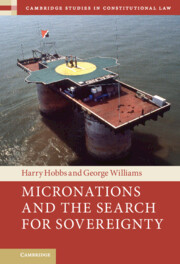Book contents
- Micronations and the Search for Sovereignty
- Cambridge Studies in Constitutional Law
- Micronations and the Search for Sovereignty
- Copyright page
- Contents
- Preface
- 1 Prince Leonard Prepares for War
- 2 Statehood and Micronations
- 3 Motivations
- 4 Performing Sovereignty
- 5 State Responses
- 6 The Future of Micronationalism
- Appendix List of Micronations Discussed
- Index
2 - Statehood and Micronations
Published online by Cambridge University Press: 23 December 2021
- Micronations and the Search for Sovereignty
- Cambridge Studies in Constitutional Law
- Micronations and the Search for Sovereignty
- Copyright page
- Contents
- Preface
- 1 Prince Leonard Prepares for War
- 2 Statehood and Micronations
- 3 Motivations
- 4 Performing Sovereignty
- 5 State Responses
- 6 The Future of Micronationalism
- Appendix List of Micronations Discussed
- Index
Summary
This chapter develops a detailed conceptual framework for micronations to better understand and interrogate their common features and considerable diversity. It does so by comparing and contrasting micronations to recognised sovereign states and other state-like entities. As we explain, a wide variety of entities with more or less effective government, more or less legitimate claims to statehood, and more or less recognition and acceptance by individual states and the international community, exist around the world. By developing a ‘statehood spectrum’ along which a range of state and state-like entities may be placed, these complexities can be unravelled and a clearer picture of what makes micronations distinct emerges. We find that micronations are self-declared nations that perform and mimic acts of sovereignty, and adopt many of the protocols of nations, but lack a foundation in domestic and international law for their existence and are not recognised as nations in domestic or international forums.
Keywords
- Type
- Chapter
- Information
- Micronations and the Search for Sovereignty , pp. 20 - 81Publisher: Cambridge University PressPrint publication year: 2022

